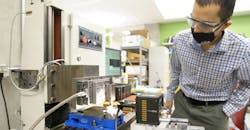Solving a Machinist’s Dilemma, One Molecule at a Time
How can you improve the cutting of “gummy” metals? Purdue University innovators have come up with an answer—and their findings may help in manufacturing products and reducing component failures.
The researchers previously showed that the application of a permanent marker or Sharpie, glue or adhesive film made it easier to cut metals such as aluminum, stainless steels, nickel, copper and tantalum for industrial applications. Marking the metal surface to be machined with ink or an adhesive dramatically reduced the force of cutting, leaving a clean cut in seconds. Now, they have discovered how these films produce the effect.
“We have found that you only need the organic film from the markers or glue to be one molecule thick for it to work,” said Srinivasan Chandrasekar, Purdue professor of industrial engineering. “This ultra-thin film helps achieve smoother, cleaner and faster cuts than current machining processes,” he said. “It also reduces the cutting forces and energy, and improves the outcomes for manufacturing across industries such as biomedical, energy, defense and aerospace.”
The research is published in Science Advances. The study involves a collaboration between researchers at Purdue, Osaka University (Japan) and the Indian Institute of Science (India). The research is supported by the National Science Foundation and U.S. Department of Energy.
If a significant improvement can be made to the machinability of gummy metals or alloys – that is how well they cut, drill or grind – then there is potential to lower the cost of products, improve their performance or enable new and improved product designs.
The researchers found, using organic monolayer films created by molecular self-assembly, that the molecule chain length and its adsorption to the metal surface are key to realizing these improvements. By using the “right” organic molecules, the metal is locally embrittledm resulting in improved machining.
“We are also learning through our discovery more about how environmental factors influence failure of metals,” said Anirudh Udupa, a lead author on the study and a researcher in Purdue's School of Industrial Engineering. “As we decipher how the organic molecular films improve the machinability of these metals, the better also is our understanding of common environment-assisted failures in metals, such as stress-corrosion cracking, hydrogen embrittlement and liquid metal embrittlement.”
The Purdue innovators worked with the Purdue Research Foundation Office of Technology Commercialization to patent this technology. The researchers are looking for partners to continue developing their technology.
